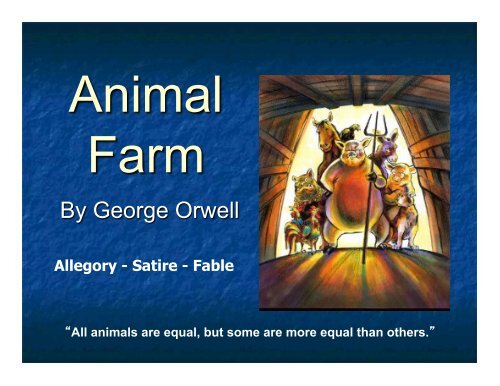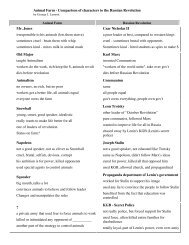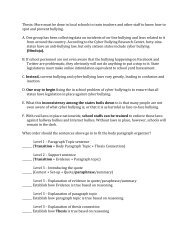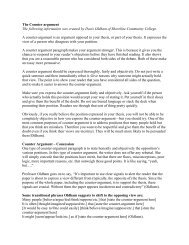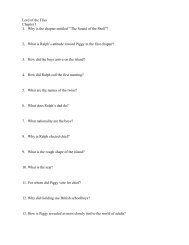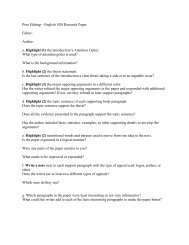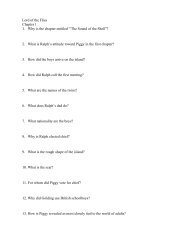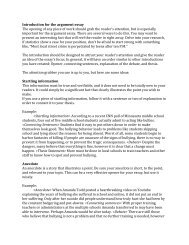Animal Farm Background Slideshow
Animal Farm Background Slideshow
Animal Farm Background Slideshow
Create successful ePaper yourself
Turn your PDF publications into a flip-book with our unique Google optimized e-Paper software.
<strong>Animal</strong><br />
<strong>Farm</strong><br />
By George Orwell<br />
Allegory - Satire - Fable<br />
“All animals are equal, but some are more equal than others.”
George Orwell<br />
British Author & Journalist<br />
n 1903-1950<br />
n Born in India<br />
n At that time India was a part of the<br />
British Empire, and Blair's father,<br />
Richard, held a post as an agent in<br />
the Opium Department of the<br />
Indian Civil Service.<br />
“Liberty is telling people what they do not want to hear.”
George Orwell<br />
British Author & Journalist<br />
n The Blair family was not very<br />
wealthy - Orwell later described<br />
them ironically as "lower-uppermiddle<br />
class". They owned no<br />
property, had no extensive<br />
investments; they were like<br />
many middle-class English<br />
families of the time, totally<br />
dependent on the British Empire<br />
for their livelihood and<br />
prospects.<br />
“Liberty is telling people what they do not want to hear.”
George Orwell<br />
British Author & Journalist<br />
n<br />
n<br />
n<br />
Noted as a novelist and critic, as<br />
well as a political and cultural<br />
commentator<br />
One of the most widely admired<br />
English-language essayists of the<br />
20th century<br />
Best known for two novels critical<br />
of totalitarianism in general, and<br />
Stalinism in particular:<br />
n <strong>Animal</strong> <strong>Farm</strong><br />
n Nineteen Eighty-Four<br />
“Liberty is telling people what they do not want to hear.”
1984<br />
n<br />
The novel, published in<br />
1949, takes place in 1984<br />
and presents an imaginary<br />
future where a totalitarian<br />
state controls every aspect<br />
of life, even people's<br />
thoughts. The state is<br />
called Oceania and is ruled<br />
by a group known as the<br />
Party; its leader and<br />
dictator is Big Brother.
George Orwell and His Beliefs<br />
n<br />
n<br />
n<br />
Orwell was a person who had a reputation for<br />
standing apart and even making a virtue of his<br />
detachment.<br />
This “outsider” position often led him to oppose the<br />
crowd.<br />
Orwell’s beliefs about politics were affected by his<br />
experiences fighting in the Spanish Civil War.<br />
Interesting Fact:<br />
George Orwell’s real name was Eric Blair.
George Orwell and His Beliefs<br />
n<br />
n<br />
He viewed socialists, communists, and fascists as<br />
repressive and self-serving.<br />
He was skeptical of governments and their<br />
willingness to forsake ideas in favor of power.<br />
Interesting Fact:<br />
George Orwell’s real name was Eric Blair.
Why <strong>Animal</strong>s?<br />
n In explaining how he came to write <strong>Animal</strong><br />
<strong>Farm</strong>, Orwell says he once saw a little boy<br />
whipping a horse and later he wrote,<br />
n “It struck me that if only such animals became aware<br />
of their strength we should have no power over them,<br />
and that men exploit animals in much the same way<br />
as the rich exploit the [worker].”
George Orwell in India<br />
n He was born in India and<br />
spent his early years<br />
there since his father held<br />
a post there.<br />
n He was a lonely boy who<br />
liked to make up stories<br />
and talk with imaginary<br />
companions.<br />
n As an adult, he worked<br />
for the Imperial Police in<br />
British occupied India.
What is <strong>Animal</strong> <strong>Farm</strong>?<br />
n<br />
A masterpiece of political<br />
satire, <strong>Animal</strong> <strong>Farm</strong> is a tale<br />
of oppressed individuals who<br />
long for freedom and struggle<br />
to stay true to their ideals of<br />
equality<br />
Interesting Fact: Orwell initially struggled<br />
to find a publisher for <strong>Animal</strong> <strong>Farm</strong>.
What is <strong>Animal</strong> <strong>Farm</strong>?<br />
n<br />
n<br />
The story traces the<br />
deplorable conditions of<br />
mistreated animals who can<br />
speak and who exhibit many<br />
human characteristics. After<br />
extreme negligence by their<br />
owner, the animals revolt and<br />
expel Mr. Jones and his wife<br />
from the farm.<br />
The tale of the society the<br />
animals form into a<br />
totalitarian regime is<br />
generally viewed as Orwell's<br />
critique of the communist<br />
system in the former Soviet<br />
Union.<br />
Interesting Fact: Orwell initially struggled<br />
to find a publisher for <strong>Animal</strong> <strong>Farm</strong>.
Significance Today<br />
n<br />
n<br />
n<br />
But why – now that Soviet Communism<br />
has fallen and the Cold War is over –<br />
does <strong>Animal</strong> <strong>Farm</strong> deserve our<br />
attention?<br />
The answer lies in the power of<br />
allegory. Allegorical fables, because<br />
they require us to make comparisons<br />
and connections, can be meaningful to<br />
any reader in any historical period.<br />
The story of <strong>Animal</strong> <strong>Farm</strong> will always<br />
have lessons to teach us about the<br />
ways that people abuse power and<br />
manipulate others.
Significance Today<br />
n<br />
n<br />
Orwell's chilling story of the betrayal of<br />
idealism through tyranny and<br />
corruption is as fresh and relevant<br />
today as when it was first published in<br />
1945.<br />
It reminds us to always be wary of<br />
those in power.
Children’s Book? – No!<br />
n<br />
After <strong>Animal</strong> <strong>Farm</strong> was published in 1945, George<br />
Orwell discovered with horror that booksellers were<br />
placing his novel on children’s shelves. According to<br />
his housekeeper, he began traveling from bookstore<br />
to bookstore requesting that the book be shelved with<br />
adult works. This dual identity — as children’s story<br />
and adult satire — has stayed with Orwell’s novel for<br />
more than fifty years.
The Fable<br />
n The fable is one of the oldest<br />
literary forms - much, much older<br />
than the novel or the short story. A<br />
fable is usually short, written in<br />
either verse or prose, and conveys<br />
a clear moral or message. The<br />
earliest fables still preserved date<br />
back to 6th Century Greece B.C.E.<br />
The author of these fables, Aesop,<br />
used animal characters to stand for<br />
human "types." For example, a fox<br />
character might embody the human<br />
characteristics of cunning and<br />
cleverness. Though Aesop's animal<br />
fables were ostensibly about<br />
animals, they were really<br />
instructional tales about human<br />
emotions and human behavior.
<strong>Animal</strong> Fables<br />
n<br />
The most popular animal fables of<br />
the 20th Century are the Just So<br />
Stories (1902) written by Rudyard<br />
Kipling. Kipling's fables were<br />
adapted by Disney in the movie<br />
The Jungle Book. Orwell admired<br />
Kipling and the Just So Stories<br />
would seem to have influenced the<br />
form of <strong>Animal</strong> <strong>Farm</strong>. Orwell took<br />
the short animal fable and<br />
expanded it to the length of a short<br />
novel in the form of an allegory.
Allegory<br />
n Most fables have two levels of meaning. On the surface, the<br />
fable is about animals. But on a second level, the animals<br />
stand for types of people or ideas. The way the animals<br />
interact and the way the plot unfolds says something about<br />
the nature of people or the value of ideas.<br />
n Any type of fiction that has multiple levels of meaning in this<br />
way is called an allegory.
Allegory (cont’d)<br />
Boxer<br />
n <strong>Animal</strong> <strong>Farm</strong> is strongly allegorical,<br />
but it presents a very nice balance<br />
between levels of meaning.<br />
n On the first level, the story about<br />
the animals is very moving. You can<br />
be upset when Boxer’s fate is<br />
sealed without being too aware of<br />
what he stands for. But at the same<br />
time, each of the animals does serve<br />
as a symbol.<br />
n The story's second level involves the<br />
careful critique Orwell constructed to<br />
comment on Soviet Russia.
Allegory (cont’d)<br />
n<br />
It is possible to argue that<br />
<strong>Animal</strong> <strong>Farm</strong> also has a<br />
third and more general level<br />
of meaning. For instance, the<br />
pigs need not only represent<br />
specific tyrannical soviet<br />
leaders. They could also be<br />
symbols for tyranny more<br />
broadly: their qualities are<br />
therefore not simply the<br />
historical characteristics of a<br />
set of actual men but are the<br />
qualities of all leaders who<br />
rely on repression and<br />
manipulation.<br />
Squealer, Snowball, & Napoleon
Satire<br />
n In a satire, the writer<br />
attacks a serious issue by<br />
presenting it in a ridiculous<br />
light or otherwise poking fun<br />
at it. Orwell uses satire to<br />
expose what he saw as the<br />
myth of Soviet socialism.<br />
Thus, the novel tells a story<br />
that people of all ages can<br />
understand, but it also tells<br />
us a second story— that of<br />
the real-life revolution.<br />
Soviet Coat of Arms
n<br />
Irony<br />
Irony results when there is a<br />
disparity between what an<br />
audience would expect and what<br />
really happens. Orwell uses a<br />
particular type of irony –<br />
dramatic irony. He relies on the<br />
difference between what the<br />
animals understand and what<br />
we, the audience, can conclude<br />
about the situation at <strong>Animal</strong><br />
<strong>Farm</strong>.<br />
Snowball below the commandments.<br />
Napoleon overindulging himself.
n<br />
Irony<br />
We know just what the animals<br />
know, but we can see so much<br />
more of its significance than<br />
they can. The conclusions we<br />
reach that the animals never<br />
quite get to are all the more<br />
powerful because we arrive at<br />
them ourselves, without the<br />
narrator pointing these things<br />
out directly.<br />
Snowball below the commandments.<br />
Napoleon overindulging himself.
Irony (cont’d)<br />
n<br />
Orwell uses dramatic irony to<br />
create a particularly subtle<br />
satire. Satire stages a<br />
critique of an individual,<br />
group, or idea by<br />
exaggerating faults and<br />
revealing hypocrisies. The<br />
dramatic irony of <strong>Animal</strong><br />
<strong>Farm</strong> achieves this aim<br />
indirectly. We see the<br />
hypocrisy that the animals<br />
don't and therefore<br />
understand in this backward<br />
fashion that the book is<br />
deeply critical of the pigs.
Who is Karl Marx?<br />
n<br />
Many of the ideals behind the<br />
Soviet revolution were based on<br />
the writings and teachings of Karl<br />
Marx. A German intellectual who<br />
lived in the mid-1800s, Marx<br />
believed that societies are divided<br />
into two segments, a working class<br />
and an owner class. The working<br />
class creates all the products,<br />
while the owner class enjoys all<br />
the benefits of these products.<br />
This class division leads to<br />
inequality and oppression of the<br />
working class. Marx’s objective<br />
was to create a classless society in<br />
which the work is shared by all for<br />
the benefit of all, and he believed<br />
revolution was the way to achieve<br />
this goal.
KWLS<br />
Make a table with four columns on the back of<br />
your notes.<br />
The first column is “What you know about Soviet<br />
style communism.”<br />
The second column is “What you want to know”<br />
The third is “What you learn (in the following<br />
slides)?”<br />
The fourth is “What you still want to learn?”
When History and Literature Merge<br />
n<br />
Critics often consider <strong>Animal</strong><br />
<strong>Farm</strong> to be an allegory of<br />
the Russian Revolution. In<br />
the early 1900s, Russia’s<br />
Czar Nicholas II faced an<br />
increasingly discontented<br />
populace. Freed from feudal<br />
serfdom in 1861, many<br />
Russian peasants were<br />
struggling to survive under<br />
an oppressive government.<br />
By 1917, amidst the<br />
tremendous suffering of<br />
World War I, a revolution<br />
began<br />
Czar Nicholas II<br />
Vladimir Lenin<br />
Joseph Stalin<br />
Leon Trotsky
When History and Literature Merge<br />
n<br />
In two major battles, the<br />
Czar’s government was<br />
overthrown and replaced by<br />
the Bolshevik leadership of<br />
Vladimir Lenin. When Lenin<br />
died in 1924, his former<br />
colleagues Leon Trotsky,<br />
hero of the early<br />
Revolution, and Joseph<br />
Stalin, head of the<br />
Communist Party, struggled<br />
for power. Stalin won the<br />
battle, and he deported<br />
Trotsky into permanent<br />
exile.<br />
Czar Nicholas II<br />
Vladimir Lenin<br />
Joseph Stalin<br />
Leon Trotsky
Joseph Stalin<br />
n<br />
Once in power, Stalin began, with<br />
despotic urgency and exalted<br />
nationalism, to move the Soviet<br />
Union into the modern industrial<br />
age. His government seized land<br />
in order to create collective<br />
farms. Stalin’s Five Year Plan<br />
was an attempt to modernize<br />
Soviet industry. Many peasants<br />
refused to give up their land, so<br />
to counter resistance Stalin used<br />
vicious military tactics.<br />
Joseph Stalin
Joseph Stalin<br />
n<br />
Rigged trials led to executions of<br />
an estimated 20 million<br />
government officials and ordinary<br />
citizens. The government<br />
controlled the flow and content of<br />
information to the people, and all<br />
but outlawed churches.<br />
Joseph Stalin
<strong>Farm</strong>er Jones = Czar Nicholas II<br />
n <strong>Farm</strong>er Jones<br />
n<br />
n<br />
n<br />
The irresponsible owner of the<br />
farm<br />
Lets his animals starve and<br />
beats them with a whip<br />
Sometimes shows random<br />
kindness<br />
n Czar Nicholas II<br />
n<br />
n<br />
n<br />
Weak Russian leader during<br />
the early 1900s<br />
Often cruel and brutal to his<br />
subjects<br />
Displays isolated kindess
Characters<br />
n<br />
n<br />
n<br />
n<br />
n<br />
Old Major<br />
An old boar whose speech<br />
about the evils perpetrated by<br />
humans rouses the animals<br />
into rebelling.<br />
His philosophy concerning the<br />
tyranny of Man is named<br />
<strong>Animal</strong>ism.<br />
He teaches the animals the<br />
song “Beasts of England”<br />
Dies before revolution<br />
n<br />
n<br />
n<br />
n<br />
Karl Marx<br />
The inventor of communism<br />
Wants to unite the working<br />
class to overthrow the<br />
government.<br />
Dies before the Russian<br />
Revolution
<strong>Animal</strong>ism = Communism<br />
n <strong>Animal</strong>ism<br />
n Taught my Old Major<br />
n No rich, but no poor<br />
n Better life for workers<br />
n All animals are equal<br />
n Everyone owns the<br />
farm<br />
n Communism<br />
n Invented by Karl Marx<br />
n All people are equal<br />
n Government owns<br />
everything<br />
n People own the<br />
government
Snowball = Leon Trotsky<br />
n Snowball<br />
n<br />
n<br />
Boar who becomes one of the<br />
rebellion’s most valuable<br />
leaders.<br />
Very clever, wants to make life<br />
better for the animals<br />
n Leon Trotsky<br />
n<br />
n<br />
A pure communist leader who<br />
was influenced by the<br />
teachings of Karl Marx.<br />
He wanted to improve life for<br />
people in Russia, but was<br />
driven away by Lenin’s KGB.
Napoleon = Joseph Stalin<br />
n<br />
n<br />
n<br />
Napoleon<br />
Boar who leads the rebellion<br />
against <strong>Farm</strong>er Jones<br />
After the rebellion’s success, he<br />
systematically begins to attempt<br />
to control all aspects of the farm.<br />
n<br />
n<br />
n<br />
Joseph Stalin<br />
The communist dictator of the<br />
Soviet Union from 1922-1953 who<br />
killed all who opposed him.<br />
He loved power and used the<br />
KGB (secret police) to enforce his<br />
ruthless, corrupt antics.
Characterization in Fables<br />
n<br />
We already know that a fable is a narration intended to<br />
enforce a useful truth. Fables have two important<br />
characteristics. First, they teach a moral or lesson. In<br />
<strong>Animal</strong> <strong>Farm</strong>, the moral involves Orwell’s views about<br />
Soviet politics. Second, the characters are most frequently<br />
animals. These animal characters often function as a satiric<br />
device to point out the follies of humankind.
Characterization in Fables<br />
n<br />
Though Old Major, Snowball, and Napoleon may represent<br />
Karl Marx, Leon Trotsky, and Joseph Stalin, many of the<br />
story characters are much more general. Some animals are<br />
grouped together as a single character—“the sheep,” “the<br />
hens,” and “the dogs.” Orwell also capitalizes on the traits<br />
generally associated with particular animals, such as sheep<br />
as followers and dogs as loyal.
Squealer & Boxer<br />
n<br />
Squealer<br />
n A big mouth pig who becomes Napoleon’s<br />
mouthpiece. Throughout the novel, he displays<br />
his ability to manipulate the animals’ thoughts<br />
through the use of hollow, yet convincing<br />
rhetoric.<br />
n Represents the propaganda department that<br />
worked to support Stalin’s image; the<br />
members of the department would use lies to<br />
convince the people to follow Stalin.<br />
Squealer<br />
n<br />
Boxer<br />
n A dedicated but dimwitted horse who aids in<br />
the building of the windmill but is sold to a<br />
glue-boiler after collapsing from exhaustion.<br />
n Represents the dedicated, but tricked<br />
communist supporters of Stalin. Many stayed<br />
loyal even after it was obvious Stalin was a<br />
tyrant. Eventually they were betrayed,<br />
ignored, and even killed by him.<br />
Boxer
Jessie & Moses<br />
n<br />
Jessie<br />
n The farm's sheepdog, she keeps tabs<br />
on the pigs and is among the first to<br />
suspect that something is wrong at<br />
<strong>Animal</strong> <strong>Farm</strong>.<br />
n<br />
Moses<br />
n A tame raven and sometimes-pet of<br />
Jones who tells the animals stories<br />
about a paradise called Sugarcandy<br />
Mountain.<br />
n Moses represents religion. Stalin used<br />
religious principles to influence people<br />
to work and to avoid revolt.<br />
Jessie<br />
Moses
Spoilers Ahead
More Characters<br />
Pilkington<br />
Jones' neighbor, he finds a way to profit from <strong>Animal</strong> <strong>Farm</strong> by forming an<br />
alliance with the pigs.<br />
Muriel<br />
A goat who believes in the rebellion, she watches as <strong>Animal</strong> <strong>Farm</strong> slips<br />
away from its founding principles.<br />
Mollie<br />
A vain horse who resists the animal rebellion because she doesn't want to<br />
give up the petting and treats she receives from humans. Mollie represents<br />
vain, selfish people in Russia and throughout the world who ignored the<br />
revolution and sought residence in more inviting countries.<br />
Benjamin<br />
The most cynical of all the animals, the farm's donkey doubts the leadership<br />
of the pigs but is faithfully devoted to Boxer. Benjamin represents all the<br />
skeptical people in Russia and elsewhere who weren’t sure revolution<br />
would change anything.<br />
The Sheep<br />
Not tremendously clever, the sheep remind themselves of the principles of<br />
animalism by chanting "four legs good, two legs bad."<br />
The Dogs<br />
Napoleon’s private army that used fear to force the animals to work; they<br />
killed any opponent of Napoleon. The dogs represent Stalin’s loyal KGB<br />
(secret police). The KGB were not really police, but mercenaries used to<br />
force support for Stalin.
<strong>Animal</strong> <strong>Farm</strong> Revolution<br />
= Russian Revolution<br />
n <strong>Animal</strong> <strong>Farm</strong> Revolution<br />
n Was supposed to make life<br />
better for all, but . . .<br />
n Life was worse at the end.<br />
n The leaders became the<br />
same as, or worse than the<br />
other farmers (humans) they<br />
rebelled against.<br />
n Russian Revolution<br />
n Was supposed to fix the<br />
problems created by the<br />
Czar, but . . .<br />
n Life was even worse after<br />
the revolution.<br />
n Stalin made the Czar look<br />
like a nice guy.
This powerpoint was kindly donated to<br />
www.worldofteaching.com<br />
http://www.worldofteaching.com is home to over a<br />
thousand powerpoints submitted by teachers. This is a<br />
completely free site and requires no registration. Please<br />
visit and I hope it will help in your teaching.


